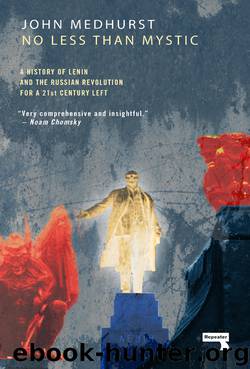No Less Than Mystic by John Medhurst

Author:John Medhurst
Language: eng
Format: epub
Tags: No Less Than Mystic: A History of Lenin and the Russian Revolution for a 21st-Century Left
ISBN: 9781910924488
Publisher: Watkins Media
Published: 2017-05-17T04:00:00+00:00
CHAPTER ELEVEN
Surveillance State
On 7th December, 1917, six weeks after the Bolshevik insurrection, Sovnarcom created the All–Russian Extraordinary Commission for the Struggle Against Counter–Revolution and Sabotage, popularly known by its Russian initials–Cheka. The Cheka was answerable only to the Council of People’s Commissars, not to the Soviet Executive. In his biography of Lenin, Tony Cliff emphasised how small the Cheka was to begin with and that the few death sentences it passed “were on common criminals” (he then barely mentioned it again except for a few pages on the civil war). In reality, by the end of 1917 the Cheka were releasing common criminals from Petrograd jails in order to make room for political prisoners.
It is true that immediately after 25th October the Bolsheviks released many of those who had fought against the Insurrection and, at Martov’s request, the Menshevik and SR Ministers who had been arrested. There was an element of genuine idealism in this, although the main reason was the urgent need to assuage the Soviet Congress and the Left SRs. It was also why the post of People’s Commissar for Justice was given to the Left SR Isaac Steinberg when his party joined Sovnarcom. Steinberg would attempt, unsuccessfully, to control and regulate the Cheka.
Cheka officers, under their feared chief Felix Dzerzhinsky, had wide discretionary powers to enter premises and arrest any they suspected of “counter–revolutionary” activity. With the Kadet Party declared illegal in November 1917 and all who supported the convoking of the Constituent Assembly smeared as counter-revolutionary, this was in effect anybody beyond the ranks of the Bolshevik Party. Very quickly the Cheka began to arrest and execute political opponents. The nature of the Cheka’s work, its untrammeled powers, its special ethos and identity (down to the leather overcoats Dzerzhinsky secured for his men as protection from the typhus virus which bred easily in woolen clothes) attracted a certain type of man, one who found satisfaction in investigation, surveillance, intimidation and coercion. Dzerzhinsky’s deputies Unschlicht, Peters and Katsis reflected the force they commanded: a mix of puritanical political activists, secret policemen and bullying sadists. The “Special Purpose Units” led by Unschlict grew in time to a paramilitary force of 300,000 men authorised to detain and execute as they pleased.
Western commentators and historians who condemn the Cheka invariably ignore the activities of their own state’s political police. At the same time as Russia was convulsed by revolutionary upheaval the US Congress passed the 1917 Espionage Act and 1918 Sedition Act. The Espionage Act removed the right of free speech against the war. The US Postal Service immediately stopped delivery of the Socialist Party’s magazine, The American Socialist, followed shortly after by almost every other radical publication. Socialist Party offices were raided and ransacked and the Chicago office was occupied for three days by federal agents. The socialist Kate O’Hara was sentenced to five years in prison for the crime of making a speech in which she said, “the women of the United States are nothing more nor less than brood sows, to raise children to get into the army and be made into fertilizer”.
Download
This site does not store any files on its server. We only index and link to content provided by other sites. Please contact the content providers to delete copyright contents if any and email us, we'll remove relevant links or contents immediately.
| Anthropology | Archaeology |
| Philosophy | Politics & Government |
| Social Sciences | Sociology |
| Women's Studies |
The Secret History by Donna Tartt(19025)
The Social Justice Warrior Handbook by Lisa De Pasquale(12182)
Thirteen Reasons Why by Jay Asher(8883)
This Is How You Lose Her by Junot Diaz(6869)
Weapons of Math Destruction by Cathy O'Neil(6260)
Zero to One by Peter Thiel(5782)
Beartown by Fredrik Backman(5733)
The Myth of the Strong Leader by Archie Brown(5491)
The Fire Next Time by James Baldwin(5422)
How Democracies Die by Steven Levitsky & Daniel Ziblatt(5210)
Promise Me, Dad by Joe Biden(5139)
Stone's Rules by Roger Stone(5078)
A Higher Loyalty: Truth, Lies, and Leadership by James Comey(4946)
100 Deadly Skills by Clint Emerson(4911)
Rise and Kill First by Ronen Bergman(4775)
Secrecy World by Jake Bernstein(4737)
The David Icke Guide to the Global Conspiracy (and how to end it) by David Icke(4696)
The Farm by Tom Rob Smith(4500)
The Doomsday Machine by Daniel Ellsberg(4480)
